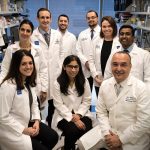
Funded by Lloyd Family Clinical Scholar Fund
The term DNA damage response (DDR) inhibitors is used in cancer treatment to refer to a group of drugs, which block important processes that cancers rely on to repair their DNA. While PARP inhibitors (a type of DDR inhibitor) are approved, they do not benefit all patients, and their effects are not long-lasting. Combining PARP (or other DDR inhibitors) with drugs that may boost their effects is a promising approach, which has been shown in laboratory studies (cancer cells or animal testing) to be more effective than each drug given alone. My program of DDR inhibitor combination trials aims to benefit patients with cancers with defects in DDR and other important processes by matching them with suitable DDR inhibitors in combination with carefully selected drugs, therefore personalizing cancer treatment for each patient. Multiple new and promising DDR inhibitor combinations will be tested. Trials not well-tolerated or effective will be stopped early, while trials with promising combinations will be increased in size. We will personalize these treatments for each patient by studying their cancer/blood samples to ensure that the genetic defects of the tumor match the combination treatment, so as to increase the chance of success. If patients stop responding to treatment, they will be allowed to switch to a different DDR inhibitor combination guided by fresh analyses of new cancer/blood samples. This program of trials aims to advance our DDR scientific knowledge, improve outcomes for each patient and guide future trials in order to get better treatments approved.

Funded by the Constellation Gold Network Distributors
Patients with pancreatic cancer are usually diagnosed with advanced disease and suffer from a very poor prognosis with limited treatment options. This is due to the lack of early detection tests and the largely asymptomatic onset of the disease. In the past decade, drugs that pit the body’s immune response against cancerous cells—also known as immunotherapeutics—have been used to treat a variety of cancers but seem to only benefit a limited number of patients. In particular, immunotherapeutics seem generally ineffective against pancreatic cancer, although it is unknown if there is a subset of pancreatic cancer patients who may benefit from this therapeutic approach. To understand why, we will use a new platform developed in our laboratory to study how different populations of cancerous and immune cells within the tumor interact with each other as well as with the other cells in the tumor’s surroundings (i.e. tumor microenvironment). Additionally, the platform will track how these interactions change when the tumor is exposed to disturbances such as immunotherapeutics. Our study will allow us to understand how individual cell populations contribute to the pancreatic tumor’s response—or lack thereof—to immunotherapeutics as well as its ability to evade the immune response. Ultimately, our findings can be used to develop tests that can predict whether a patient with pancreatic cancer will benefit from a certain immunotherapeutic approach.

Abeloff V Scholar * (Three-way Tie for Top Rank)
Funded by the Hirsch Family in memory of Ann Hirsch
There is a strong need for new treatments for brain tumor patients. To address this need, we asked how a common mutation in brain tumors may create weaknesses that we could use to develop new treatments. We identified a process that brain tumor cells with this common mutation rely on to live. Next, we used a drug to block this process and found that it kills brain tumor cells with this common mutation. We would like to know why these cells rely on this process and whether brain tumors grown in mice respond to this drug. If our work is successful, our efforts could lead to new studies that will test this drug in human brain tumor patients. We are hopeful that our discovery could lead to improvements in the lives of brain tumor patients.

Colon cancer is the second leading cause of cancer-related deaths in the United States. An increasing number of human studies have highlighted the association among the consumption of sugary drinks, obesity, and the risk of colon cancer. It is currently thought that sugar is harmful to our health mainly because consuming too much can lead to obesity. It is well known that obesity increases the risk of many types of cancer, including colon cancer. However, whether a direct, causal link exists between sugar consumption and colon cancer has remained unknown.
Our group recently showed that consuming a modest amount of refined sugar every day—the equivalent of a human drinking about 12 ounces of a sugar-sweetened beverage daily—accelerates colon tumor development in mice, and it does so independently of causing obesity. The proposed project will identify the molecular mechanisms by which sugar enhance colon tumor development. In particular, we will focus on how sugary drinks alter the bacteria living in the gut and how these altered gut bacteria contribute to tumor development. To this end, we hope to identify bacteria that increase specifically in response to sugar consumption that could serve as new targets for prevention and treatment for colon cancer patients. Given that more than half of American young adults consume at least one sugar-sweetened beverage daily, and that young-onset colon cancer is on the rise for unknown reasons, any positive findings from this project will be of immense significance.

Funded by the Stuart Scott Memorial Cancer Research Fund
Cancer cachexia is a wasting disease with significant fat and muscle loss occurring in 1/3 of all patients with cancer and causing 1/3 of all cancer patient deaths. It is also makes patients not want to eat. Cancer patients with cachexia live half as long as patients with the same cancers without cachexia. These patients have a poor quality of life which prevents them from taking medications to treat their cancer as well. Currently there are no treatments for this wasting disease. Therefore, clinicians often use medications that are not approved by the government to treat cancer cachexia with little benefit.
We aimed to better understand how cancers can cause cachexia wasting in order to create new medications for this disease. Our research has identified a molecule made by cancers that causes fat breakdown and causes decreased food intake. These cancer-secreted factors do this by acting directly on the fat and the part of the brain that controls food intake. These factors also reprogram the fat to secrete other factors that also affect the brain’s appetite center. We believe the combination of these events is responsible for the wasting seen in these cancer patients. Our research proposal will try to identify how these molecules affect the fat tissue and the brain to cause cancer cachexia to help us develop new medications for this under-treated disease. Creating a treatment for cancer cachexia will improve cancer patients’ quality of life and overall life span.

Pancreatic cancer is the 3rd leading cause of cancer-related death in the United States, with a five-year survival rate of less than 9 percent. Activation of the immune response in the microenvironment is associated with better outcomes in pancreatic cancer patients. The tumor and gut microbiota has recently been shown to influence tumor progression by modulating the tumor microenvironment.
We have recently demonstrated that the composition of the gut microbiome may determine tumor behavior and outcomes in pancreatic ductal adenocarcinoma (PDAC) patients. We have identified specific bacteria signatures in the tumors of long-term survivors (LTS) compared to the stage-matched- short-term survivors (STS). We have also shown that transplantation of fecal microbiome from LTS or healthy controls of pancreatic cancer patients into a mouse model of PDAC significantly reduces pancreatic cancer growth. These important findings prompted us to target tumor microbiome as a therapeutic approach in pancreatic cancer patients. Here, we propose to transplant stools from PDAC long term survivals or healthy controls into PDAC patient to change their immune suppressive behavior to immunoactivated one. To this end, we will first analyze the changes in microbiome of PDAC patients after the transplantation of gut microbiome from long term survivals or health controls. Next, we will evaluate the tissue obtained from biopsy and surgical specimen for the changes in tumor microbiome of PDAC patients. Finally, we will characterize the tumor immune infiltrates from tissues obtained from PDAC patients to see if we can switch PDAC immunosuppressive TME into immunoactivated by fecal microbial transplantation. This proposal would be the stepping stone to move forward efficacy trials in PDAC patients combining FMT with standard treatment or immunotherapy.

Funded by Hooters of America, LLC
According to estimates from the International Agency for Research on Cancer, worldwide, there were 18.1 million new cancer cases diagnosed with 9.6 million deaths in 2018. In other words, one in 5 men and one in 6 women experience cancer during their lifetime, and one in 8 men and one in 11 women die from the disease. As such, there is an urgent need for finding better treatments to reduce cancer-associated death. BRCA1 and BRCA2 are two genes that, when mutated, can cause cancer. Studies by many research groups have revealed critical roles of BRCA1 and BRCA2 in protecting our genetic material from damage caused by sunlight, radiation, and other environmental exposures. While BRCA mutations have been linked to a greatly increased risk of developing cancer, we do not yet fully understand the biological process of DNA repair mediated by the BRCA genes. This poses a challenge for patient counseling, determining prevention strategies, and the formulation of treatment plans when disease strikes. Here, we describe a research project to study BRCA1 and BRCA2 designed to fill this knowledge gap. The information and tools from our work will help explain why BRCA mutations cause disease and help formulate treatment regimens that are more effective than current ones.

Funded by the Dick Vitale Pediatric Cancer Research Fund
Sarcomas are cancers of connective tissues in the human body. It affects children and teenagers more than adults. Cancers that spread to other parts of the body are difficult to treat and are not often curable. A new treatment approach called immunotherapy uses the body’s own immune system to fight cancer. Our approach uses immune cells of the body, namely T cells, to find and kill tumor cells after introducing an artificial molecule called chimeric antigen receptor (CAR). These CAR-enhanced T cells developed in our laboratory recognize a protein on the surface of the cancer cell, namely HER2. Patients with advanced sarcoma received these HER2-specific CAR T cells in our ongoing clinical trial. The CAR T cells did not cause severe adverse reactions in any of the treated patients. More than half of the 10 patients who received the cell treatment benefited from it, with 2 patients achieving tumor elimination and 4 others achieving cancer stabilization. We will now test if larger dose of T cells can be tolerated or increase the chances of benefit. We will also study immune responses in these patients to identify mechanisms, if any, that can lead to improved treatments. Finally, we will evaluate a new molecule that can help CAR T cells overcome tumor signals that turns them off. The insights gained from this study will help design and develop targeted treatments for sarcoma.

Funded by the Gastric Cancer Foundation
Peritoneal carcinomatosis (PC) — an aggressive metastasis of gastric cancer — is always fatal.
Approximately 20 percent of patients newly diagnosed with gastric cancer already have PC; and about
45 percent of those diagnosed will eventually develop PC. Researchers have a poor understanding of gastric cancer cells that populate the peritoneal cavity. Current therapies offer little help and research is limited. The lack of understanding of PC puts clinicians at a disadvantage when determining the best strategies for patients with this disease.
Researchers at The University of Texas MD Anderson Cancer Center are overcoming these obstacles through the Intraperitoneal Program. This program, which is led by Jaffer Ajani, M.D., professor of Gastrointestinal Medical Oncology at MD Anderson, is aiming to conduct high-quality multiplex profiling of PC cells and stroma (surrounding tissue). The program allows Dr. Ajani and his team to generate multiplex data for a large number of samples from patients and use innovative tools that, he believes, will result in transformative ways this disease is treated.
To carry out this research, Dr. Ajani’s team has already collected abdominal fluid from many patients with intraperitoneal metastases. From these samples, they have identified cancer stem cells, which they believe are responsible for spreading into the peritoneal cavity. Eventually, Dr. Ajani’s team aims to develop a deeper understanding of the immune biology of the peritoneal cavity and how cancer stem cells recruit normal cells to be protected from the immune system.
Too many lives have been lost to this cancer. In order to develop therapies that can be tested in preclinical models, researchers need to conduct a deep dive investigation into PC using multidimensional integrative analyses to comprehensively profile the tumor and its microenvironment. The goal of this work is to discover therapeutic targets, biomarkers and signatures with prognostic and predictive potentials, enabling us to build illuminating predictive models. The researchers’ ultimate mission is to use every resource available to find viable therapies to fight this terrible disease.

Supported by Bristol-Myers Squibb through the Robin Roberts Cancer Thrivership Fund
While immunotherapy can sometimes result in dramatic and prolonged responses, it can also cause major toxicities. Immune-related adverse events (irAEs) are quite different than the toxicities seen with other cancer treatments, such as conventional chemotherapy. They occur when immunotherapy causes the patient’s own immune system to attack normal organs in the body. These toxicities may occur at any point in treatment, may be severe, and—of particular concern to cancer survivors—may be permanent.
irAEs remain poorly understood partly because immunotherapy research has focused almost exclusively on tumor biology, which is certainly relevant to immunotherapy effectiveness. However, we believe that toxicities irAEs have more to do with patients’ own immune systems. Our research team has expertise in cancer, immunology, and genetics. We have already collected clinical information and blood samples on hundreds of patients receiving cancer immunotherapy. With this information, we have identified some blood-based tests that may predict the future development of irAEs.
We now take this research to the next level by proposing genetic and functional tests to identify underlying predisposition to irAEs. Specifically, we will study DNA and RNA in blood samples from our existing patient cohort. If successful, our research could ultimately help (1) identify high-risk patients, (2) customize therapy, (3) tailor monitoring, (4) expand immunotherapy use, and (5) prevent toxicities.













